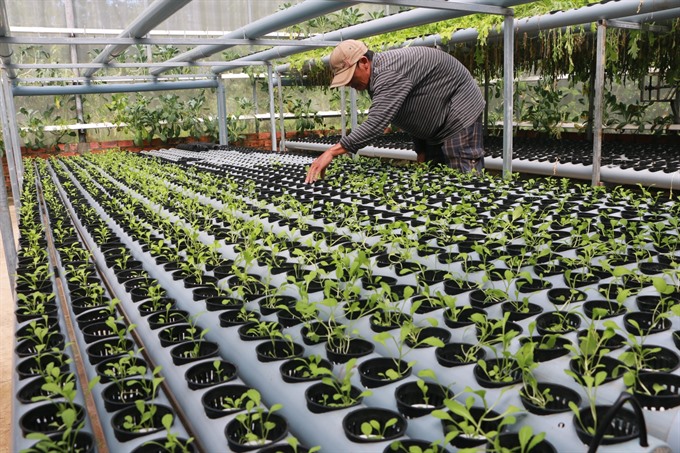.jfif) Opinion
Opinion

Từ Thị Tuyết Nhung, director of the Việt Nam Participatory Guarantee System, a member of the Việt Nam Organic Agriculture Association, talks to the newspaper Kinh tế Việt Nam & Thế giới on the need to have a new concept on organic agriculture
 |
| A farmer attends to his hydroponic vegetable garden in the southern province of Bình Phước. — VNA/VNS Photo Dương Chí Tưởng |
Từ Thị Tuyết Nhung, director of the Việt Nam Participatory Guarantee System, a member of the Việt Nam Organic Agriculture Association, talks to Kinh tế Việt Nam & Thế giới (Việt Nam & World Economy) newspaper on organic agriculture.
What do you think about the market potential for organic products?
Organic products have big potentials for their development in Việt Nam and the world.
However, a big issue we are facing is how to organise production and ensure close supervision throughout the production chain to ensure the products are totally organic. This is a big issue for us and we have vowed to use all efforts to meet the technical standards required for organic products.
Recently, quite a few cases of food poisoning have been reported in the media and they have raised concern among the public about the issue of food safety. As a result, many consumers have tried to look for food which is safe for them and their family. Many of them have started to look for organic products. However, in reality, in Việt Nam the issue of food safety and organic agriculture has not yet received due attention.
Can you talk more about organic products?
Some people simply think the production of organic products means the farmers don’t use chemicals throughout production. That’s a totally wrong concept about the production chain of any organic product.
Just like some farmers think if they cut down the number of times they spray pesticides, their products will become ‘organic products’. That’s wrong! What’s more important is the use of chemical fertilisers on their plants. According to science, chemical fertilisers are more toxic than pesticide sprays. That’s why many farmers have kept saying their products are safe because they don’t use pesticides while they have forgotten the important knowledge that the use of chemical fertiliser is hazadous.
What’s more dangerous is that when someone is poisoned by pesticide, they are often given first aid immediately. But when we consume food that contains chemicals, the chemicals will continue to develop in our body and they will only be detected when we become ill.
This is food for thought for all consumers and even authorities to have a correct understanding of the definition of an organic product.
Why do Vietnamese consumers struggle to find organic products?
It is not difficult for consumers to find organic products. What’s more important is that they should have confidence in the safety for their health in eating organic agro-products.
In our market nowadays, consumers have a wide choice of organic products. For example, Vietnamese products which are recognised as organic products all have the PGS (Participatory Guarantee System) trademark. So, after 10 years of this trademark, our products have secured a foothold in the market.
What are the challenges you and your colleagues have faced in securing a foothold for organic products in the market?
In the past we faced a lot of challenges in securing a foothold in the market for our organic products. But things have changed quite a lot.
Some difficulties we still face in our plan to expand the acreage for organic production are land issues and the Government’s policy on organic agriculture.
The Việt Nam Organic Agriculture Association has published a booklet on organic agriculture production to help farmers nationwide be more aware of their responsibility for their products according to the slogan ‘farm to fork’.
More recently, the Government has issued a decree on organic agriculture and it has ushered in a new era for organic agriculture to develop. — VNS




